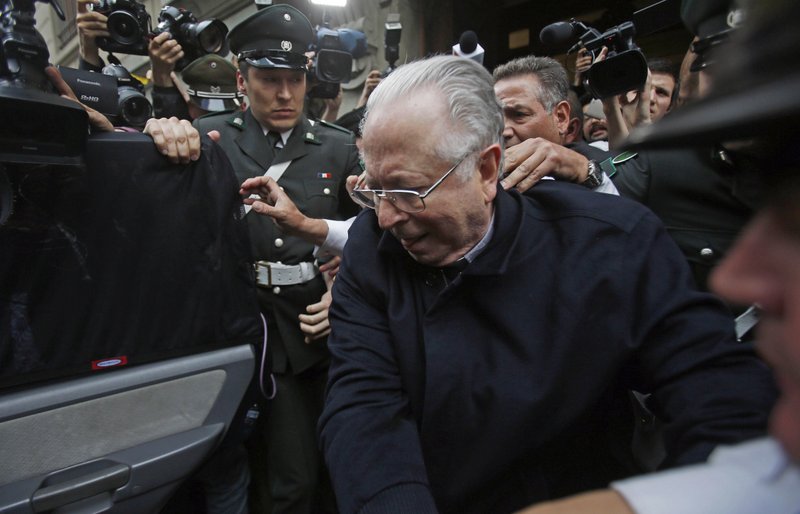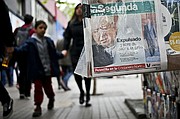VATICAN CITY -- Pope Francis has defrocked a Chilean priest who was a central character in the global sex abuse scandal rocking his papacy, invoking his "supreme" authority to stiffen an earlier sentence because of the "exceptional amount of damage" the priest's crimes had caused.
In a statement Friday, the Vatican said Francis had laicized 88-year-old Rev. Fernando Karadima, who was originally sanctioned in 2011 to live a lifetime of "penance and prayer" for having sexually abused minors in the upscale Santiago parish he ran.
The Vatican said Francis was doing so for "the good of the church."
"It is without doubt an exceptional measure, but Karadima's grave crimes have caused exceptional damage in Chile," Vatican spokesman Greg Burke said.
The "penance and prayer" sanction has been the Vatican's punishment of choice for elderly priests convicted of raping and molesting children. It has long been criticized by victims as too soft and essentially an all-expenses-paid retirement, and Karadima's whistleblowers had pressed for it to be toughened.
The Vatican cited no new evidence or crime that prompted Francis to revisit the case and impose what clergy consider to be the equivalent of a death sentence. It said he acted out of his conscience and as a pastor, referring to the canon that lays out the pope's "supreme, full, immediate and universal power" to serve the people of God.
The statement said the decree, signed Thursday, takes effect immediately and that Karadima was informed of it Friday.
The decision appeared aimed at showing a get-tough approach to sex abuse after a series of missteps by Francis and accusations by a former Vatican ambassador that Francis had rehabilitated a now-disgraced former American cardinal early on in his papacy.
The move was welcomed by Chilean victims as overdue.
"I never thought I'd see this day," said Juan Carlos Cruz, a survivor of Karadima's abuse who has been a key driver in pushing for justice for victims and an overhaul of the Chilean church hierarchy.
Thanking Francis, Cruz tweeted: "I hope many survivors feel a bit of relief today."
While some conservative critics might bristle at another display of raw papal power from the Argentine Jesuit, U.S. canon lawyer Nick Cafardi said Francis was acting fully within his legal right to revisit the case since there's no such thing as double jeopardy in canon law.
"The pope has the ability to intensify a penalty," Cafardi said in an email.
Francis sparked a crisis in his papacy earlier this year when he strongly defended one of Karadima's proteges, Bishop Juan Barros, against accusations that he had witnessed Karadima's abuse and ignored it.
Francis had claimed that the accusations against Barros were "calumny" and politically motivated, and he defended his 2015 decision to appoint Barros bishop of a small Chilean diocese over the objections of the faithful and many in the Chilean hierarchy.
After realizing that something was amiss, Francis ordered a Vatican investigation that uncovered decades of abuse and cover-ups by the Chilean church leadership. Francis apologized to the victims, inviting Cruz and fellow survivors James Hamilton and Jose Andres Murillo to the Vatican for four days of talks. He set about making amends, including getting every active bishop in Chile to offer to resign.
To date, he has accepted seven of the more than 30 resignations offered, including that of Barros.
It was the second time in a month that Francis has laicized a Chilean priest, after five years in which the Vatican appeared to favor less drastic sentences.
On Sept. 15, the archdiocese of Santiago announced that Francis had defrocked the Rev. Christian Precht, citing the Latin terminology -- "ex officio et pro bono Ecclesiae" -- on his own authority and for the good of the church.
Information for this article was contributed by Patricia Luna of The Associated Press.
A Section on 09/29/2018

